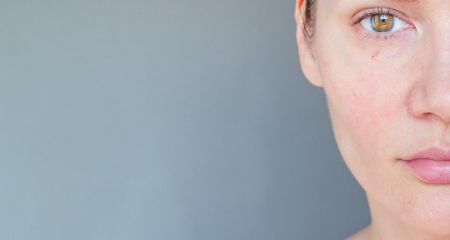
Facing persistent facial redness/ flushing, dilated blood vessels or acne-like eruptions? It’s possible you’re dealing with rosacea. The expert dermatologists at Northstar Dermatology are adept at evaluating and treating rosacea with personalized treatment regimens that get rid of active flares and help prevent new ones.
Rosacea is a chronic skin condition typically involving the central face. The symptoms can vary among individuals but include the following (note: you can have more than one symptom):
Individuals with rosacea can easily go from flares that can last weeks to months to times of remission with minimal to no symptoms. Several factors can incite these flare-ups, including:
The most important treatment strategy is to avoid the above triggers as much as possible. When trigger avoidance is not enough, treatment strategies include:
Gentle Skincare and Sun Protection
Using a gentle cleanser, moisturizer, and sunscreen will help calm the skin and allow your face to better tolerate topical treatments. Of course, always use a broad-spectrum sunscreen (mineral sunscreens tend to be less irritating on rosacea patients’ skin compared to chemical sunscreens) with SPF 30 or higher, reapply at least every 2 hours, and wear wide-brimmed hats and sunglasses.
Topical Medications
There are several topical medications (creams, gels, lotions) that tackle specific aspects of rosacea. Topical antiinflammatory agents such as azeleic acid and benozyl peroxide tackle the acne-like breakouts, while the topical antibiotic cream or gel metronidazole (Metrocream, Metrogel) and topical anti-mite cream ivermectin (Soolantra) similarly treat acne-like lesions as well as redness. Oxymetazoline (Rhofade) or brimonidine (Mirvaso) cream can treat the flushing and persistent redness of rosacea. Sulfur-containing washes can reduce redness if used consistently. All of these medications can help reduce the burning and stinging of rosacea.
Oral Medications
Low-dose tetracyclines such as minocycline and doxycycline are sometimes used to reduce more advanced inflammation which can help prevent thickening of the skin. For severe acne-like breakouts and inflammation, isotretinoin (Accutane) can be used.
Laser and Surgical Treatments
Lasers can be instrumental in obliterating visible blood vessels, moderating facial redness, and reducing skin thickening. For advanced skin thickening, electrosurgery (hot loop) or radiofrequency procedures may be done.